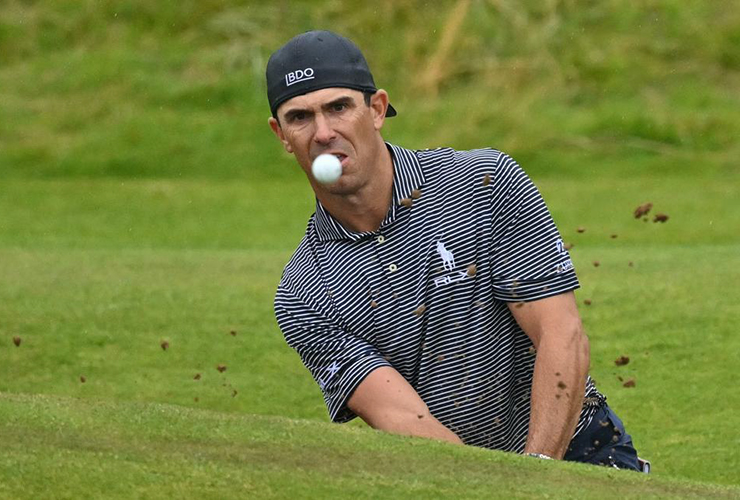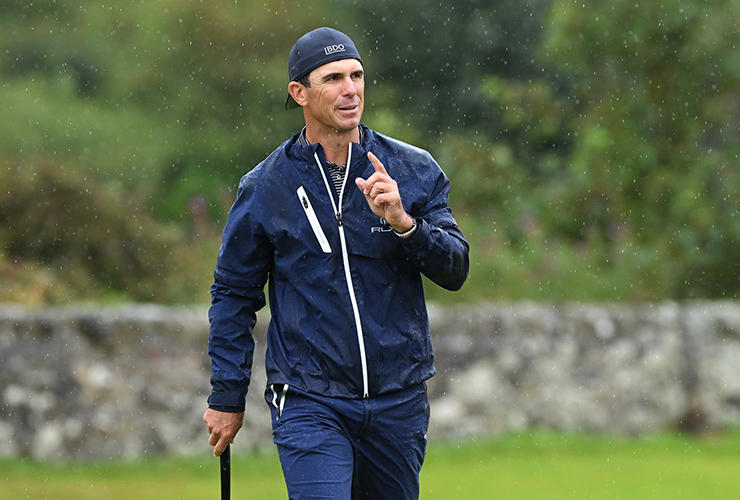It’s never been easy to know exactly what to make of the man who leads the 152nd Open Championship at Royal Troon with 18 holes to play. Not much about the career of Billy Horschel has ever been easy or straightforward. Seeming contradictions and wild contrasts dot the 37-year-old Floridian’s professional landscape. Plusses and minuses are everywhere. Ups and downs too.
We’re talking here about a man who won the Memorial Tournament in 2022, then shot an opening-round 84 in 2023.
We’re talking about a man who, eight years ago on the course he hopes will soon provide the legacy he craves, shot 67 in the opening round, then hit his ball 18 times more the following day.
We’re talking about a man whose CV is nothing short of impressive. Over the course of a career that has spanned a decade-and-a-half, Horschel has amassed eight victories on the PGA Tour, as well as claiming the FedEx Cup back in 2014. He is also a past winner of the biggest event on the DP World Tour, the BMW PGA Championship at Wentworth.
But we’re also talking about a man whose standing in the game—and in his own mind—is diminished by an extraordinarily ordinary record in golf’s four biggest events.
This week on the shores of the Firth of Clyde the three-time All-American at the University of Florida is making his 43rd start in a major championship. In the previous 42, he has but two top-10s and has missed the cut 14 times. More specifically, his nine previous appearances in the Open Championship have seen him home for the weekend six times. His best finish is a mediocre T-21 at St. Andrews two years ago.
“The Open record can be a little deceiving,” he claims. “I’ve been unfortunate enough to be on the bad side of some draws. Here in ’16, the weather was pretty nasty, the nastiest weather I’ve ever played in. It was blowing 30, raining sideways. The course was a brute that day. I’ve played the Dunhill Links Championship the last few years and felt better on seaside courses. When I come to the Open, I feel more comfortable.”
Still, overall, go figure. This is a wide range of fortunes that merits some explanation. How can someone so proficient so much of the time, perform so abjectly when it matters most?
Billy Horschel with a brilliant shot from the bunker on the 14th.
He has that to save par and remain tied for the lead. pic.twitter.com/sCxqCO12Ig
— The Open (@TheOpen) July 20, 2024
“The majors mean so much to me,” admits Horschel. “It’s a legacy thing. You can submit your legacy in the game of golf by winning a major, by winning multiple majors. I’ve always felt I’ve had the game to play well in majors. I just had to get out of my own way. I’ve always felt like I needed to be perfect. You’ve got to play perfect golf in majors to be able to win. I know that isn’t the case, but I’ve been a slow learner when it comes to how to approach the majors. I’ve done a better job the last couple years though.”
To that end, Horschel has modified his approach to the events that mean the most. Speaking on the eve of this championship he outlined to Golf Digest the changes he has made to his preparation and how that contrasts with his pre-tournament work at a regular event. For one thing, more time was spent on the course than on the range. And for another, he homed in on the shots he knew would really matter when the competition got going.
“During the practice days I’ve played more holes than I normally do,” he revealed. “On the PGA Tour my routine is to play nine holes on Tuesday and nine more on Wednesday. I’ve been on tour for 15 years and sometimes I’ve only played nine holes before I tee off on Thursday. Because I know the courses so well. This week I’ve played nine holes on Monday, then 18 on Tuesday and nine more on Wednesday. So I’ve played a lot more holes. My focus was on learning where I need to miss. I think that’s true of a lot of players. We play more than we practice at a major.”
Again though, the biggest key for Horschel was seeing the in-between shots, those that are played on the ground more than in the air. On a links—even one softish after a poor summer even by Caledonian standards—the ball must land short of its ultimate target before bouncing and rolling. It’s a three-dimensional operation.
“I love that,” said Horschel. “The more factors there are in shots, the more indecision you see. Which means the better players have an advantage you don’t always get on the PGA Tour. They are the ones who adjust best to different conditions and questions. And when you get that right, you can trust your judgement so much more.”

Billy Horschel – GLYN KIRK
There was also an equipment adjustment. Out went Horschel’s 5-wood from his bag, replaced by a 2-iron.
“That’s normal over here,” he said. “You want to hit the ball low and have it run onto the greens. Typically, you have make a score going out here, then hang on coming in. If you’re not under par on the 10th tee, you know you have to play some golf coming in.”
That part of the plan is working well enough. The two-under third-round 69 that sees Horschel one-shot clear of a six-strong chasing pack that includes two major champions in Justin Rose and Xander Schauffele was made up of a four-under-par front-nine 32 and a “hang-on for dear life” two-over 37 coming home.
“I’ve worked my entire life to be in this position,” said Horschel. “I’ve learned how to handle my emotions. I’ve learned how to embrace a lot of things. I’m never afraid to fail. If it’s my time tomorrow, it’s my time, and I’m going to be ecstatic. If it’s not, then we’ll get on the horse again, and we’ll work hard to get back in that position again.
“I’ve been in the lead many times going into a final round,” he continued. “I’ve won a lot of really good events on the PGA Tour. I’ve won some great events on DP World Tour. But there’s a couple things missing. Being part of a Ryder Cup—hopefully a victorious Ryder Cup—and then a major. I want to win more than one major. So this means a little bit more. We all know that. We know what this means to everyone. I know what it means to my legacy in the game of golf and what I want to accomplish.”
And with that he was off to watch the darts on television. Just one last way to embrace life in Scotland.
Main Image: Stuart Franklin/R&A









